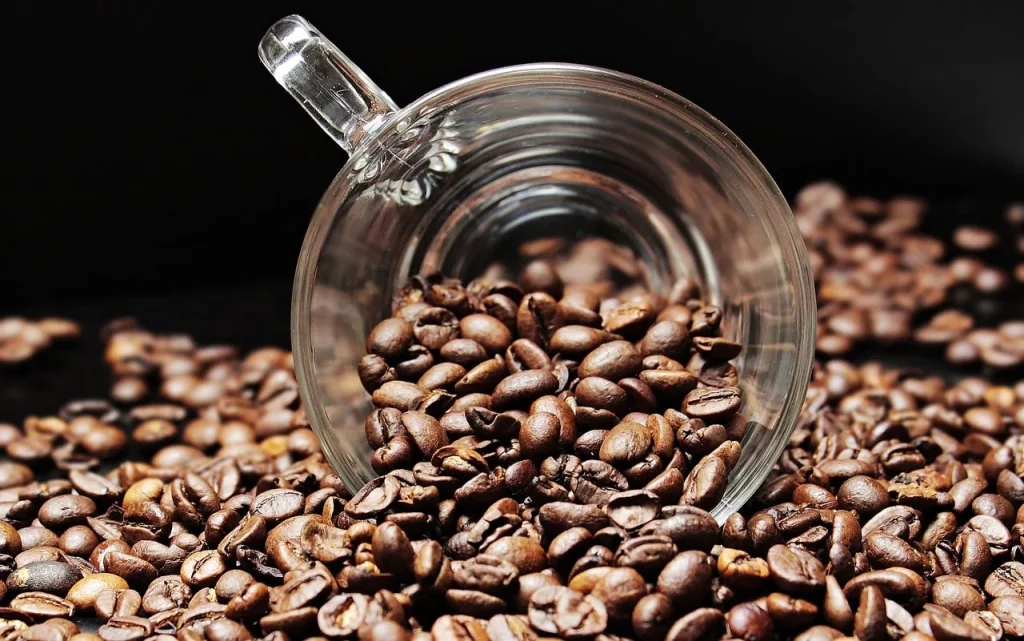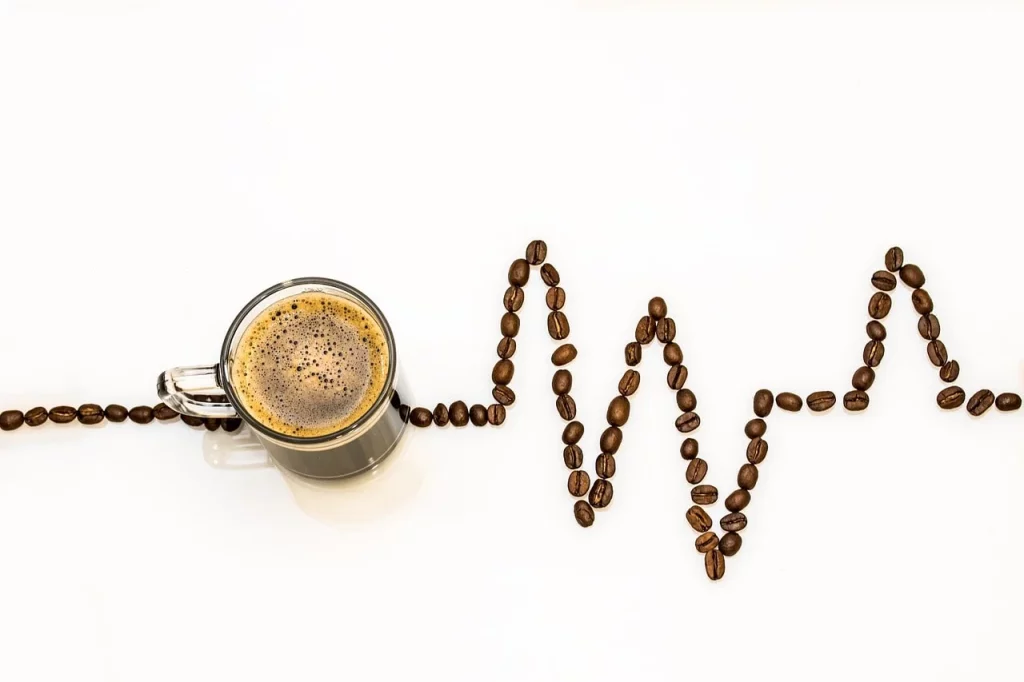How many cups of coffee does it take to jumpstart your morning? If you’re like most of us, caffeine is more than just a beverage—it’s a daily ritual. But how much do we actually know about this stimulant?
In this article, we dive into some fascinating facts about caffeine. From its historical origins to its surprising health benefits, get ready to explore the world of caffeine like never before!
I never laugh until I’ve had my coffee.
Clark Gable
Caffeine Facts
Before we dive into the facts, keep in mind that I created a quiz for you at the end of the article. Read carefully to prove you are a coffee master.
- Caffeine is a central nervous system stimulant, categorized as a methylxanthine alkaloid.
- It is the world’s most widely consumed psychoactive substance.
- Coffee beans, tea leaves, kola nuts, and cacao pods are natural sources of caffeine.
- Caffeine can temporarily ward off drowsiness and restore alertness.
- Normal consumption of caffeine is generally considered safe.
- It works by blocking the neurotransmitter adenosine’s receptors, increasing neuronal firing in the brain.
- Caffeine also stimulates the release of other neurotransmitters, like norepinephrine and dopamine.
- It takes about 30 to 60 minutes for caffeine to reach its peak level in the blood.
- Caffeine’s half-life—the time taken for the body to eliminate half of the caffeine—varies between 3 to 5 hours in adults.
- Pregnancy and oral contraceptives can prolong caffeine’s half-life.
- Withdrawal symptoms can include headaches, irritability, and fatigue.
- Caffeine can be found in various foods, drinks, and over-the-counter medications.
- Excessive consumption can lead to side effects like insomnia and nervousness.

- It can enhance physical performance, especially in endurance sports.
- Moderate consumption may reduce the risk of developing Alzheimer’s and Parkinson’s diseases.
- Children and adolescents are advised to limit their caffeine intake.
- Caffeine can interfere with sleep, particularly if consumed in large amounts or late in the day.
- Genetic factors can influence how an individual metabolizes caffeine.
- Decaf coffee isn’t completely caffeine-free; it typically contains 1-7 mg per cup.
- Caffeine can increase metabolic rate and fat burning in the short term.
- Regular intake can lead to tolerance, where the same amount has less effect.
- Anxiety symptoms can be exacerbated by high caffeine consumption.
- Caffeine can enhance cognitive performance, particularly in terms of alertness, vigilance, and reaction time.
- Some studies suggest a link between caffeine and a reduced risk of certain cancers.
- Energy drinks often contain high levels of caffeine, along with sugar and other stimulants.
- It is possible to overdose on caffeine, though this is rare and typically involves very high doses.
- Caffeine can interact with some medications, altering their effectiveness.
- Breastfeeding women are advised to limit caffeine intake, as it can pass into breast milk.

- Caffeine’s diuretic effect is mild and does not necessarily lead to dehydration.
- Abrupt cessation can lead to withdrawal symptoms, which is why gradual reduction is often recommended.
- Caffeine can improve mood and help treat depression by increasing brain serotonin levels.
- People with certain medical conditions, like heart arrhythmias, should be cautious with caffeine.
- Filtered coffee is less likely to raise cholesterol levels compared to unfiltered coffee.
- Green tea contains caffeine but also has L-theanine, which can have a calming effect.
- Caffeine pills are available, offering a controlled dose of caffeine without other substances found in beverages.
- Some pain relievers include caffeine, as it can enhance their effectiveness.
- Chocolate contains small amounts of caffeine, especially dark chocolate.
- Soft drinks are a significant source of caffeine for many people, especially younger individuals.

- Caffeine can increase blood pressure temporarily, but this effect may diminish with regular use.
- Yerba Mate, a traditional South American drink, contains caffeine along with other xanthines.
- Guarana, a plant native to the Amazon, is another natural source of caffeine.
- Caffeine sensitivity varies greatly among individuals, influenced by genetics and other factors.
- Asthma symptoms can be mildly alleviated by caffeine due to its bronchodilator properties.
- Research is ongoing into the long-term impacts of caffeine on health.
- Caffeine can increase calcium excretion in urine, which has raised concerns about bone health.
- Some studies suggest a protective effect of caffeine against gallstone formation.
- Caffeine is sometimes used in cosmetics for its tightening and redness-reducing effects on the skin.
- Caffeine absorption can be affected by the type of food or drink it’s consumed with.
- Sports organizations have monitored caffeine use in athletes due to its performance-enhancing effects.
- Matcha, a type of powdered green tea, contains a higher caffeine concentration than regular green tea.
Caffeine Myths

We are moving forward from the facts to the myths. Let’s find out together what the actual truth is behind some common myths about caffeine.
- Caffeine Causes Dehydration
While caffeine has a mild diuretic effect, it doesn’t lead to dehydration. Moderate coffee consumption doesn’t dehydrate you. In fact, your daily coffee can contribute to your daily fluid needs. - Caffeine is Addictive
Caffeine can be habit-forming, but it’s not truly addictive in the way drugs like nicotine or heroin are. Withdrawal symptoms are generally mild and temporary. - Caffeine Has No Health Benefits
Caffeine isn’t just a pick-me-up. Studies suggest it may help protect against Parkinson’s disease, type 2 diabetes, and some forms of cancer. It’s a bit of a health champ! - Caffeine is Bad for Your Heart
Moderate caffeine intake isn’t linked to heart disease and may actually support heart health. However, excessive consumption might increase heart rate or blood pressure in sensitive individuals. - Caffeine is Harmful for Everyone
Most people can consume caffeine safely. But its effects can vary based on individual sensitivity, medical conditions, or pregnancy. It’s always wise to consult a doctor if you’re unsure.
No products found.
Caffeine Quotes

Caffeine, the world’s most widely consumed psychoactive substance, has inspired a myriad of thoughts and opinions. Below are some of my favorite quotes. Feel free to share yours in the comments so I can add them to the list.
Coffee is a language in itself.
Jackie Chan
Jackie Chan, the renowned martial artist and actor, likened coffee to a universal language, highlighting its ability to transcend cultural barriers.
I have measured out my life with coffee spoons.
T.S. Eliot
T.S. Eliot, a celebrated poet, used this metaphor to express how coffee was intertwined with the passage of time in his life.
Good communication is just as stimulating as black coffee, and just as hard to sleep after.
Anne Morrow Lindbergh
Anne Morrow Lindbergh, an acclaimed author, drew a parallel between engaging conversations and the invigorating effect of black coffee.
Without my morning coffee, I’m just like a dried-up piece of goat.
J.S. Bach
J.S. Bach, the famous composer, humorously indicated his heavy reliance on morning coffee to feel energized and functional.
Coffee is a way of stealing time which should by rights belong to your older self.
Terry Pratchett
Terry Pratchett, a renowned author, suggested that coffee has the power to temporarily energize us, borrowing energy from our future selves.
Caffeine FAQ

I hope you enjoyed all these caffeine quotes! Next up is the FAQ section. It’s important to pay close attention here, as it’s your final preparation before the quiz.
- Will caffeine keep you awake?
Absolutely! Caffeine is a stimulant that affects your central nervous system. It can prevent the onset of drowsiness by blocking the action of a natural brain chemical that encourages sleep. However, the effect varies from person to person. Some might find themselves wide awake after a late coffee, while others might snooze right through it. - Can caffeine cause headaches?
In some people, caffeine consumption can lead to headaches due to its effects on blood vessels in the brain. On the flip side, for regular caffeine consumers, skipping their usual dose can also cause headaches as a withdrawal symptom. - Are caffeine pills safe?
Caffeine pills can be safe when used responsibly and in moderation. They’re not inherently dangerous, but they can be if abused. Overuse can lead to jitteriness, anxiety, heart palpitations, and other side effects. It’s essential to follow the recommended dosage and consult with a healthcare provider, especially if you have underlying health conditions. - Can caffeine cause anxiety?
Yes, it can. Caffeine stimulates your nervous system, which can exacerbate anxiety symptoms in some individuals. It can cause feelings of nervousness, restlessness, and even panic in high doses. If you’re prone to anxiety, it might be wise to monitor your caffeine intake. - How does caffeine work?
Caffeine works by stimulating the central nervous system. It blocks adenosine, a neurotransmitter that relaxes the brain and makes you feel tired. By blocking adenosine’s effects, caffeine keeps you alert and awake. It also increases adrenaline production and boosts brain activity of the neurotransmitters dopamine and norepinephrine. This can improve mood, reaction time, memory, and mental function.
No products found.
Caffeine Quiz

Ready to test your coffee knowledge? If you fail this quiz, you might just find your coffee mysteriously replaced with hot water and a single coffee bean for aroma. The horror!
Caffeine Merch
If you are a true caffeine fan, then you definitely need to check out our brewtiful merchandise. You can find T-shirts, hoodies, mugs, and tote bags for your favorite designs. Feel free to check out all the other designs in our shop.
Conclusion
In the end, caffeine emerges as a complex character in the story of human health and culture. It’s not just a chemical; it’s a part of our social fabric, a participant in our health discussions, and a companion in our daily grind.
Let’s close this adventure with a question: If caffeine was a superhero, what would its superpower be? Let me know your ideas in the comments.
5 Sources Used For This ArticleWhat does caffeine do to your body? – Medical News Today
Caffeine – Qwark Health
Caffeine – Ataman Chemicals
Is Coffee Good for Your Brain? – Healthline


